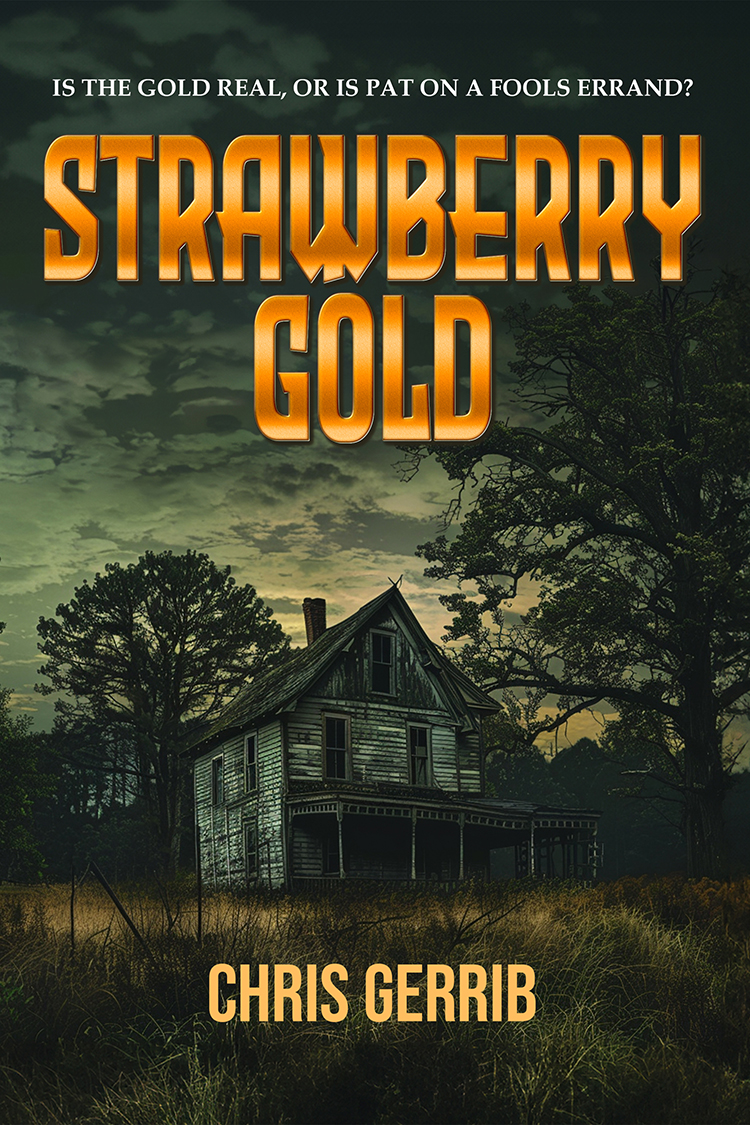
Chris Gerrib is joining us today to talk about his novel, Strawberry Gold. Here’s the publisher’s description:
It’s January 1986, and Pat Kowalski has just turned 18, but there’s no cause for celebration. His father is
dying, and the local bank is foreclosing on their house. Pat talks to his senile great-grandmother, who
tells him a story about a man dying in front of her in 1894. What she doesn’t tell him is that the man –
Mister Good Boots – had been carrying a suitcase worth of gold coins. These coins would be worth a
fortune today – if any of them are still left.
But Pat’s not the only person in their small Central Illinois town who needs money. Pat’s classmate Vince
is watching his college dream evaporate. Vince has also convinced himself that Pat’s family stole
something of great value from his family in the 1920s. He’s willing to do whatever it takes to right an old
wrong. Vince has another advantage – Pat doesn’t know Vince is looking.
The two men are both trying to figure out if there’s any gold left and, if so, where it is. While they look,
they discover a lot about their own history, from bodies buried under an abandoned restaurant to both
family’s relationships with Al Capone. It’s a race where the winner gets the gold, and the loser gets a
bullet.
What’s Chris’ favorite bit?

I really like this novel, which I find a bit surprising. See, I’ve published four science fiction novels and thought of myself as a SF guy. But throughout my publishing career, my dad has been asking me to write a “regular book.” Don’t get me wrong – he’s a great person and dad, but not much of a reader. The first two or three times he said that I ignored him. But one day I thought, “you know, he taught me how to use a spoon. Maybe I ought to humor him.” This novel is the result.
The bulk of the action is set in a fictional small town in Central Illinois in 1986, very similar to the place I grew up in. Writing the book allowed me to put all sorts of funny or interesting things I saw or heard about down on paper, with obviously the details changed to protect the innocent (or the guilty. In the book, my protagonist is creating an oral history of his great-grandmother. Here’s a story she told him.
Oral History Project by Patrick Kowalski, Eastville High School, May 2, 1986. My oldest living relative, Great-Grandmother Barbara Pikus, told me this story at her nursing home while I was having dinner with her and my grandmother, Mary Balthus.
Your uncle Luidas [she means my great-uncle, her brother] was also working for Mr. Capone.
“I thought he had a heart condition,” my grandma said.
“He did,” Great-Barb replied. She looked at me. “When he was a boy, he got a fever. Nearly killed him. Doctors said he’d never live to adulthood, and there was nothing they could do about it. Well, he made it to 1959 before it got him.”
“But he was always talking about his heart,” Grandma said.
“He was concerned,” Great-Barb replied. “Which is why he ran the still and didn’t make deliveries.” She continued with her story.
As I was saying, in 1959, his heart finally quit on him. About a week before he died, he asked me to come visit him. He was still living in his house on Strawberry Creek. I drove out to see him.
It was a nice spring day and I’d driven with the windows open. When I got there, he was in his bedroom with the windows closed and covers on. It was hot, but he was freezing, he said. I guess his heart wasn’t pumping enough blood.
I was trying to figure out what to say to him when he said, “Don’t bother. I look like shit, and I feel like shit that got stepped on.”
“He knew he was dying,” I said.
“Everybody knew he was dying,” Great-Barb said. She took a bite of her pie and chewed it carefully. “They do make good pie here. I’ll give them that.”
I suspected they bought their pies frozen from somewhere, but I didn’t say anything. She swallowed and then continued talking.
“I already talked to Mroz,” Luidas said, “I told him what I want for my funeral, and he’s already got the coffin. Don’t let him bill you for nothing.”
“I won’t.”
“Good.” He pointed at the closet with a bony finger. “Open it up.”
I did so and found a Chicago typewriter leaning against the corner of the closet.
“A what?” I asked.
“She means a Thompson submachine gun,” Grandma said. “I’ve heard this story.”
“And he hasn’t,” Great-Barb said. “So either listen or go sit in the lobby.”
“Yes, Mom.”
Great-Barb continued. “I asked Luidas if it was loaded.”
“How the hell would I know?” he said. “Haven’t used it for years.”
I checked. It was, and there was a bullet in the chamber. I cleared it and dropped the drum, which was also full.
“You wanna close your mouth?” Grandma asked me, smiling.
“How…” I said. She was talking about handling a machine gun as calmly as a toothbrush.
Great-Barb chuckled. “It wasn’t the first time I’d handled a Tommy gun.” She took another bite of her pie, chewed it careful, and then continued her story. So I asked him, “What do you want me to do with it?”
“I don’t care,” he replied. “But my wife doesn’t like it, and who knows about the kids.”
There was an old and tattered horse blanket on the shelf in the closet, so I wrapped up the gun and drum in it and put it in my car. Two days later, Luidas passed. Mroz buried him.
[Here, she reminded us that she had a prepaid funeral with Mroz Funeral Home. She discussed briefly with her daughter what songs she’d like played at that funeral. She eventually continued.]
A couple of weeks later, I finally decided to sell the gun. I had even less need for a Tommy gun than did Luidas. O’Malley had a gun shop behind his house, so I took it to him.
It was a damp day – not raining hard, but sprinkling continuously. I walked in, and he was hand-loading shotgun shells at a workbench. O’Malley and his sons did a lot of trapshooting back then.
“Mr. O’Malley,” I said. “You buy guns, right?”
“I do.”
“I’ve got one I want to sell,” I said. I was carrying the Tommy gun in the blanket.
“Well, let’s see it.”
I unwrapped the gun, and his eyes grew as big as saucers. “Where’d you get it?”
“Mr. Capone gave it to my brother Luidas in case he had problems. He’s dead, and I don’t have the kind of problems that can be solved by a Tommy gun.”
“Does it shoot?”
“I have no idea,” I said. “Last time I saw it fired was before the war.” I meant World War Two, of course.
“Well, I’ve got a range,” O’Malley said.
He had an indoor range – a space tacked onto his shop about as wide as a one-car garage but longer. We took the gun into the range, stuffed cotton into our ears, and gave it a go.
“You shot it?” I asked.
“Once more, for old time’s sake,” Great-Barb replied with a grin. “Funny gun. Not much recoil, but it wanted to twist to the right.” She stopped talking for a bit, a twinkle in her eye, then continued. “After we’d emptied the drum, a deal was struck, and I got three hundred dollars for the gun.”
LINKS:
BIO:
Chris Gerrib has wanted to be a writer since he was a child riding his bicycle to the library in the small Central Illinois town where he grew up. Since then he spent a tour in the US Navy, got an MBA, and now has a day job with a multi-national software company as a Project Manager. For fun, he plays golf, travels and is a voracious reader. He lives in the Chicago suburbs and is active in his local Rotary Club. He’s had four science fiction novels published. This is his first suspense thriller.

Thanks for the boost!